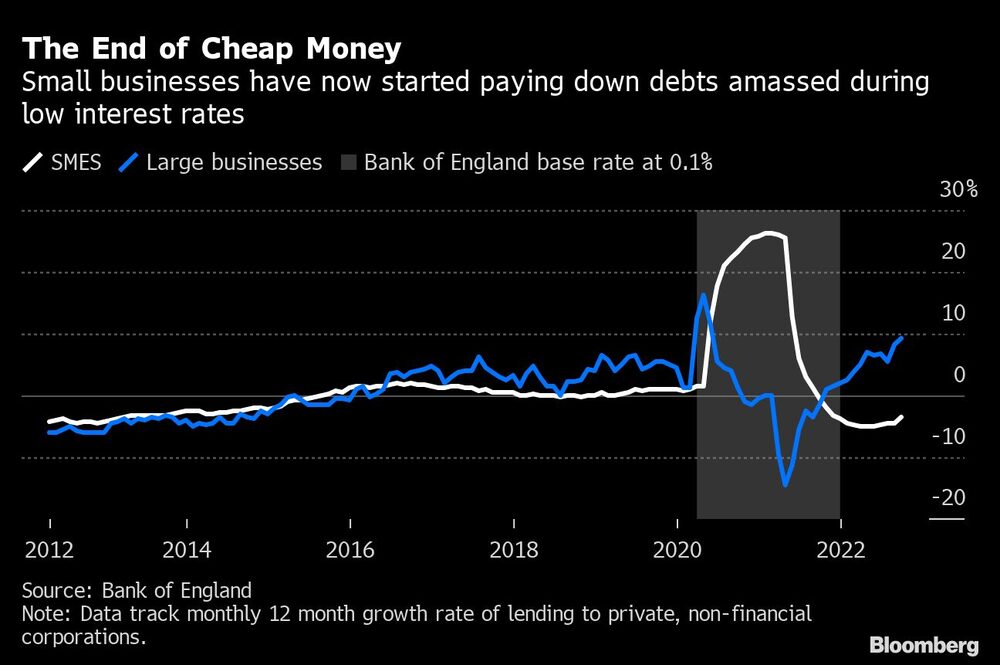Bloomberg — The Federal Reserve and Bank of England both boosted interest rates by 75 basis points this week, but communicated different messages regarding how high borrowing costs need to go in order to tame inflation.
After what was initially seen as a somewhat dovish policy statement, Fed Chair Jerome Powell told reporters after the announcement that “the ultimate level of interest rates will be higher than previously expected.” Officials in the UK went the other direction, saying peak rates will be “lower than priced into financial markets.”
The divergence reflects a substantially weaker British economy that’s teetering on the edge of, or possibly already in, a recession. Meantime, the US economy has been holding up and registered another robust month of job creation in October, implying the Fed’s job to slow demand is far from over.
Here are some of the charts that appeared on Bloomberg this week on the latest developments in the global economy:
World

While the Fed and BOE headlined major central banks raising interest rates this week, policymakers in Australia and Norway pursued smaller moves amid signs those regions’ economies are slowing. Officials in the Czech Republic left borrowing costs unchanged.

Robust labor markets are defying central bank efforts to tamp down inflation and economists’ predictions that recession is just around the corner. A strong job market is good for workers. But it can also be bad for inflation, signaling to the world’s central banks, which are raising interest rates at the most aggressive pace in decades, that they can’t ease up.
US

Powell left little doubt that he’s prepared to push rates as high as needed to stamp out inflation, even as the central bank eyes a downshift to a slower pace of increases. Addressing reporters after the central bank raised rates by 75 basis points for the fourth-straight time, Powell said “incoming data since our last meeting suggests that the ultimate level of interest rates will be higher than previously expected.”

Tiny cracks are beginning to emerge in the labor market’s resilience to higher interest rates and surging prices, but plenty of strength remains to keep Fed officials focused on stamping out inflation.
UK

The BOE delivered its biggest interest-rate increase in 33 years but strongly pushed back against market expectations for the scale of future hikes, warning that following that path would induce a two-year recession. The Monetary Policy Committee voted 7-2 to lift rates by 75 basis points to 3%, the highest level in 14 years. But in an unusually blunt comment on investors’ outlook for future hikes, it stressed the peak in rates will be “lower than priced into financial markets.”

UK consumers and businesses cut back on borrowing after a jump in interest rates, adding to headwinds for the economy. New mortgage approvals fell 10%, the sharpest pace since February 2021, and credit card borrowing along with loans taken out by businesses also declined, according to the BOE.
Europe

Euro-area inflation surged to a fresh all-time high, while the bloc’s economy lost momentum -- reinforcing fears that a recession is now all-but unavoidable. With the energy crisis continuing to ravage businesses and households, the expansion is widely expected to shift into reverse during the winter.
Asia

China’s manufacturing and services activity contracted in October, with signs that things could worsen in the coming months as the government sticks to Covid controls that have disrupted activity across the world’s second-largest economy.

South Korea’s first decline in exports in two years is among the clearest signals yet that the global economy is cooling under the pressure of rising interest rates.
Emerging Markets

Turkish annual inflation accelerated for the 17th month in a row in October, driven by a surge in food prices and energy costs, to its likely peak during President Recep Tayyip Erdogan’s two decades in power. Economists think prices may cool down in the remaining months of the year because of the base effect, referring to the sharp price surges toward the end of last year.
Read more on Bloomberg.com

